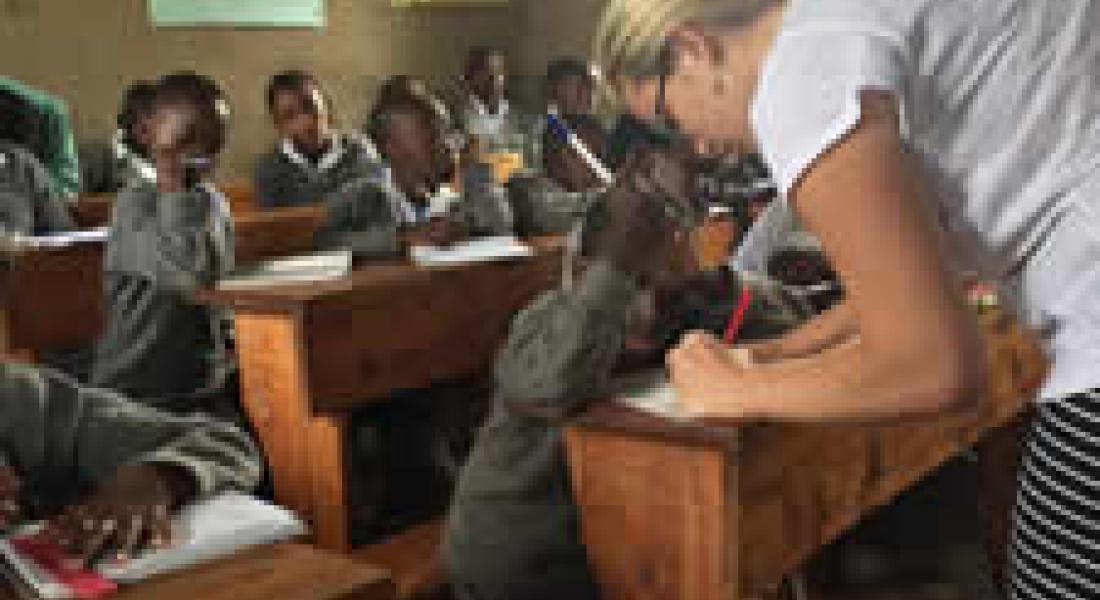
“Unless you have a conversation to really understand culture, you can’t make effective change.”
That’s what Emily Campbell ’17 learned during her Experiencing the World fellowship (ETW) this past summer. Her experience in Rwanda focused her future academic work, affirmed her career goals, and motivated her to make lasting international development change.
“In my first anthropology class, with Kellogg Faculty Fellow Cat Bolten, I was interested in the ideas that came up in relation to gender, violence, and culture,” says Emily, now an anthropology, English, and Italian studies triple major.
“I started looking into ways that I could delve further into these ideas over the summer and the Experiencing the World fellowship looked perfect.”
Emily particularly welcomed the idea of being able to combine research with teaching. She designed an independent research project, wrote a grant proposal with Bolten’s guidance, and learned in the spring that she had received an ETW.
In mid May, she flew to Rwamagana, Rwanda, where she would work as an English teacher at Nsinda Ikirezi, a Christian primary boarding school for boys and girls, while also conducting research on the everyday experiences of Rwandan schoolgirls.
Emily enjoyed bonding with the girls she lived with, all between the ages of 9 and 13.
“It was incredible to be able to serve as a role model for the girls, because they come from vulnerable family situations,” she says. “For them to learn that there is something they can aspire to, that they can have healthy relationships with adults, was something I found incredibly rewarding.”
In a lesson on the importance of flexibility while conducting international field research, Emily changed her research topic dramatically upon her arrival in Rwanda.
“I was originally going to look at the schooling of individuals during the genocide and the impact it had on their economic opportunity,” says Emily. “But I realized quickly that many of the people who hadn’t been educated had left the country and not returned.”
Ultimately, she focused her research on exploring, through conversation and interviews, the complicated experience of schoolgirls in this rural area of Rwanda.
“Women are expected to be submissive and silent; they are not permitted to have an opinion unless it agrees with and is asked for by a male,” she says.
“Through the ingraining of this culture of submission, young girls learn that they are voiceless and powerless against male authority and force. As girls get older, this complicates their experience as young Rwandans. They have been taught not to speak out and thus tend not to object to sexual assault or abuse, arranged marriage, or domestic violence.”
“I began to understand that the causes of gender inequality in Rwanda are strongly rooted in culturally constructed worldviews.”
The ETW experience in Rwanda changed her life, Emily says, setting her on a path to solve major development problems while maintaining an anthropological focus on culture.
And, confronted by the reality of the ways in which gender and violence affect Rwandan schoolgirls, she is more focused in her course selection at Notre Dame, choosing classes that involve topics of gender or violence, or the way the two affect children.
Emily Campbell“Moving forward, I am interested in pursuing a master’s or PhD in anthropology, potentially in combination with public policy. I want to combine the two, and look further into how you can use anthropology to make interesting, new, culturally sensitive approaches to international development issues,” she says.
Emily is enthusiastic about encouraging interested students to apply for an ETW.
“I’m a big proponent for stepping outside your comfort zone,” she says. “I think that’s the only way you learn to grow as a person.”
“It was a truly incredible experience,” Emily concludes. “I still think about the relationships that I made and the way it motivated me to want to make more deep, lasting international development change in the future. I witnessed not only the struggles that people face, but the opportunity that exists for people to bring their communities together to develop.”
Learn more about the Experiencing the World (ETW) fellowships.





